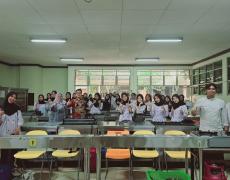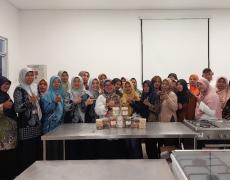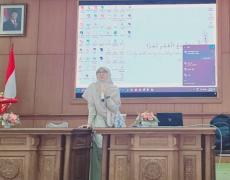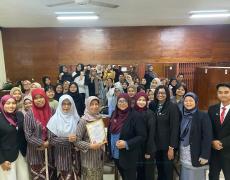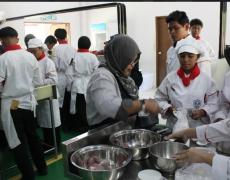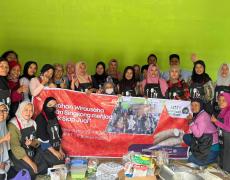Fakultas Teknik Kampus Karangmalang, Yogyakarta, 55281
You are here
INVITATION OF TEACHERS IN LEARNING EVALUATION SCIENCE
Primary tabs
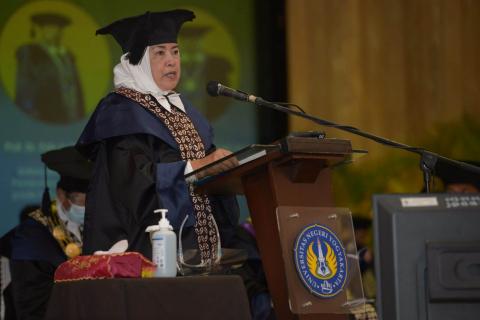
The corona virus disease pandemic-2019 (covid-19) has forced all learning processes to be carried out in a network (online). Face-to-face learning is no longer permitted because it has the potential to transmit the corona virus. Without the Covid-19 pandemic, there may still be a lot of learning being carried out face-to-face, even though the demands of learning in the industrial era 4.0 are based on digital technology. Before the Covid-19 pandemic, the Catering Engineering Education Study Program only had 16 e-learning courses that were actively registered in Be-smart and 10 courses had not yet been opened for students. During the Covid-19 pandemic, the number of courses registered in the Be-smart Culinary Engineering Education study program increased rapidly to 42 even though only 24 subjects were actively used. Learning online is more suitable for theoretical subjects but less suitable for practical subjects. The Catering Engineering Education study program has many practical courses so that there are many problems during the application of online learning. The causes of online learning problems need to be studied and evaluated to improve the next learning process. Online learning is effective if students can interact with content, friends and lecturers. The availability of social interactions can eliminate feelings of isolation in online learning. Online platforms can never replace physical presence and spontaneous interactions in the classroom. Students' desire for face-to-face lectures remains. As stated by Prof. Dr. Endang Mulyatiningsih, M.Pd. in his inauguration speech as Professor of Learning Evaluation Science at the Faculty of Engineering, Yogyakarta State University. The speech entitled "Evaluation of Online Learning During the 2019 Corona Virus Pandemic" was read in front of an open Senate meeting at the UNY Auditorium, Saturday (24/10). Endang Mulyatiningsih is the 162nd professor of UNY.
The resident of Griya Purwa Asri Kalasan Sleman said, the Directorate of Higher Education Learning has determined four components of online learning that need quality control, namely the quality of content, process, media and evaluation. Some of the criteria that need to be considered by lecturers to ensure the quality of online learning are online learning based on the student centered learning paradigm so that learning content is designed as attractive, systematic, easy to understand for independent learning, inspiring students to be active, creative, and innovative. "In addition, the learning process must provide space for interaction between students and students, students and lecturers, and students with learning materials," he explained. Technology-based delivery media that are in line with the demands of 21st century learning and online learning evaluations are carried out to monitor learning progress, provide feedback, and guarantee the quality of the measurement tools themselves.
The woman who was born in Banjarnegara, January 11, 1963 conveyed that the quality of the learning process was assessed from the interaction between lecturers and students such as learning messages, assignments, and assignment feedback. The level of student participation in online learning is still unstable for several reasons such as inconsistent student motivation and giving up easily when faced with difficulties. Unrestricted study time actually causes some students to delay learning activities. In addition, online learning still faces many challenges such as a very low level of completion of assignments, students complaining of isolation, and low learning motivation because the learning content is of poor quality. After deepening the case, students who did not take quizzes before the Covid-19 pandemic felt that they were not ready to study independently, had too many tasks, did not like reading so they were afraid of getting low scores. Students who score 0 stated that they had opened the quiz but forgot to do it until the time limit provided was up. Some students who have tried to take the quiz but got low scores are not motivated to do the next quiz.
The Doctor of Education Research and Evaluation, YSU, recommended that students have self-awareness to learn and always foster enthusiasm in order to achieve maximum learning outcomes. On the other hand, lecturers can develop material that is simple and easy to understand, because material that is too complete can cause fatigue for both lecturers and students. Learning evaluation should be combined with a randomized, good quality objective test so that it can measure students' actual abilities. Individual assignments should be in the form of projects that require students to think creatively. Giving assignments with the same answer is not good because it triggers students to copy their friends' work. (Dedy)
Album
Contact us
Copyright © 2026,





